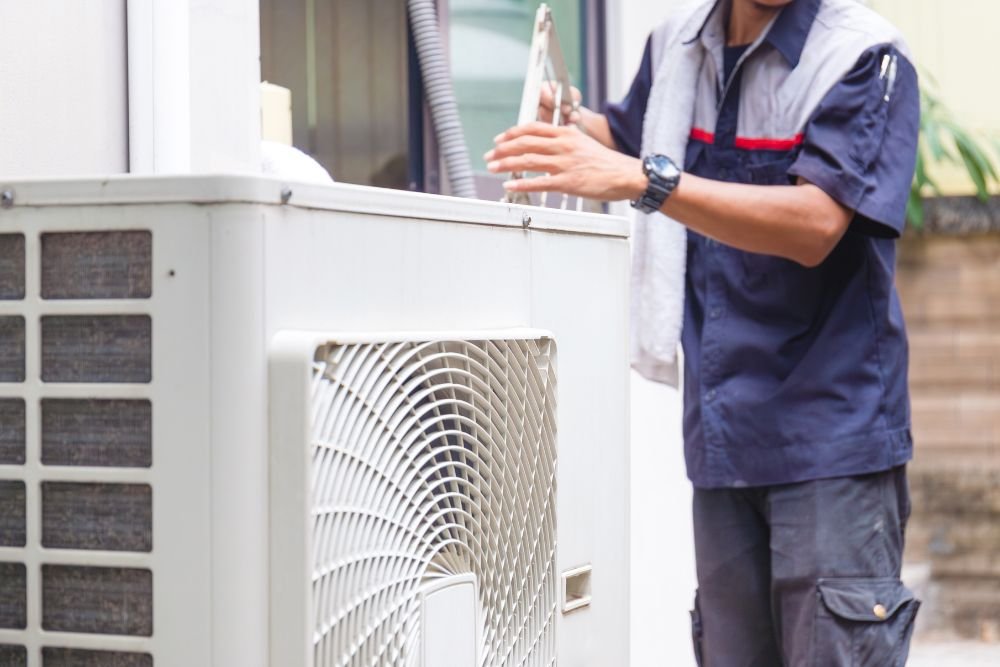Does Your AC Need a New Lease on Life?
Does Your AC Need a New Lease on Life?
Blog Article

Sweltering summers and icy winters are no match for your trusty air conditioner... until it isn't. Before you sweat it out, pay attention to these five signs that your AC might be on its last legs.
- Frequent repairs: If you're investing more and more in fixes, it might be time to replace your ancient AC.
- Low airflow: Is your AC struggling to keep up? a noticeable decrease in cooling power|a constantly running unit without proper results could indicate a failing system.
- Unusual sounds: Grinding, screeching, or clanging coming from your AC unit aren't normal. These ominous sounds often signal worn-out parts
- Soaring utility costs: A failing AC works harder and uses more energy, resulting in higher bills. If your energy costs have skyrocketed, it's worth investigating.
- Lifespan: Even with regular maintenance, air conditioners have a limited lifespan. If yours is over 20 years old, it's highly likely that replacement is on the horizon.
Ignoring these signs could lead to a complete system failure during those critical summer or winter months. Replacing your AC before it completely quits can save you time, money, and stress in the long run.
HVAC Woes: When Repairs Mean Replacing Your Whole System Swapping Out
Dealing with a persistently problematic HVAC system can be frustrating and costly. While minor repairs Top listing agent Fort Lauderdale might seem like the most sensible solution initially, there are instances where investing in a complete replacement becomes more beneficial than continually patching up an aging unit.
- If your system is old and constantly requiring extensive repairs, it's a clear sign that its endurance is nearing its end.
- When the cost of troubleshooting consistently exceeds a significant percentage of a new system's price, it's time to reconsider your options.
- Technological advancements in HVAC systems have led to remarkable developments in energy efficiency and performance. A new system can noticeably lower your energy expenses.
Ultimately, the decision to replace your HVAC system is a multifaceted one that involves analyzing factors such as age, repair history, cost of repairs versus replacement, and energy efficiency. Consulting with a qualified HVAC technician can provide valuable insights and guidance to help you make an intelligent choice.
Is Blowing Hot Air? Warning Signs Your HVAC Needs an Upgrade
Feeling like your heating/cooling/HVAC system is working overtime but not really keeping up? Your home might be showing/displaying some subtle signs that it's time for a fresh/new/updated HVAC system. A sudden/unexpected spike in your energy bills could point to an inefficient/overworked/tired system. If you're constantly adjusting/tweaking/ fiddling with the thermostat and still not finding comfort, it might be a sign that your HVAC needs some love. A strange/unusual/odd smell coming from your vents could also indicate a problem needing attention.
- Tune into for grinding/clunking/rattling noises from your HVAC unit.
- Repeated breakdowns or malfunctions can signal a worn-out system.
- If the air coming from your vents feels weak/dull/less effective, it could be a sign that your unit is struggling to circulate/distribute/push air effectively.
Don't ignore these warning signs. Addressing HVAC problems early can avoid more serious and expensive/costly/pricey repairs down the road. A properly functioning HVAC system is essential for a comfortable and healthy/safe/well-maintained home environment.
Wasting Money Away! 6 Clues Your HVAC is Finished
Is your heating system acting up? Don't ignore the signs that it's nearing its end. A broken HVAC unit can cost you a fortune in repairs. Here are 6 clear signs that your HVAC system needs immediate replacement:
- Your energy bills are soaring dramatically.
- Frequent breakdowns and repairs.
- You're frequently adjusting the thermostat to find a comfortable temperature.
- Your home appears unevenly heated or cooled.
- Odd noises coming from your HVAC unit.
- Your air conditioner is delivering warm air, even on the coldest setting.
When Temperatures Rise and Your AC Throws In the Towel
Dealing with a broken air conditioner can make a comfortable home into a sweltering sauna. Frommere refrigerant leak to a busted compressor, there are a myriad of reasons why your AC might suddenly throw in the towel. While a DIY approach might seem tempting for minor issues, sometimes it's best to contact the experts.
- Think about some signs that you need to call a professional AC technician:
If your AC unit produces a funky racket, it's time to take a closer look. Strange sounds could indicate be indicative of a loose part to a serious malfunction..
- If your energy bills skyrocket, it's possible your AC is working overtime, wasting power. A professional can diagnose the problem
{Remember,Always keep in mind,Keep this in mind: Ignoring a problematic AC unit can lead to bigger, more costly repairs down the line. By calling in the experts when you detect warning signs, you can stay ahead of major headaches and guarantee that your home stays cool and comfortable all summer long.
Age vs. Performance: Does Your HVAC Need a Change of Pace?
Your home's heating, ventilation, and air conditioning (HVAC) system is responsible for your comfort year-round. But, just like any complex machine, it naturally degrades over time. As your HVAC ages, you might start noticing signs of performance issues. These can include skyrocketing electricity expenses, inconsistent heating and cooling, ongoing service calls, and even musty odors coming from the vents. If you're experiencing any of these issues, it might be time to consider replacing your aging HVAC system.
- Be on the lookout for these signs:
- Increased utility costs
- Poor heating and cooling
- Constant maintenance needs
- Musty odors coming from the vents
Remember, a efficiently running HVAC system not only keeps you comfortable but also contributes to lower energy expenditure. Replacing your HVAC system can be a worthwhile investment that pays dividends.
Report this page